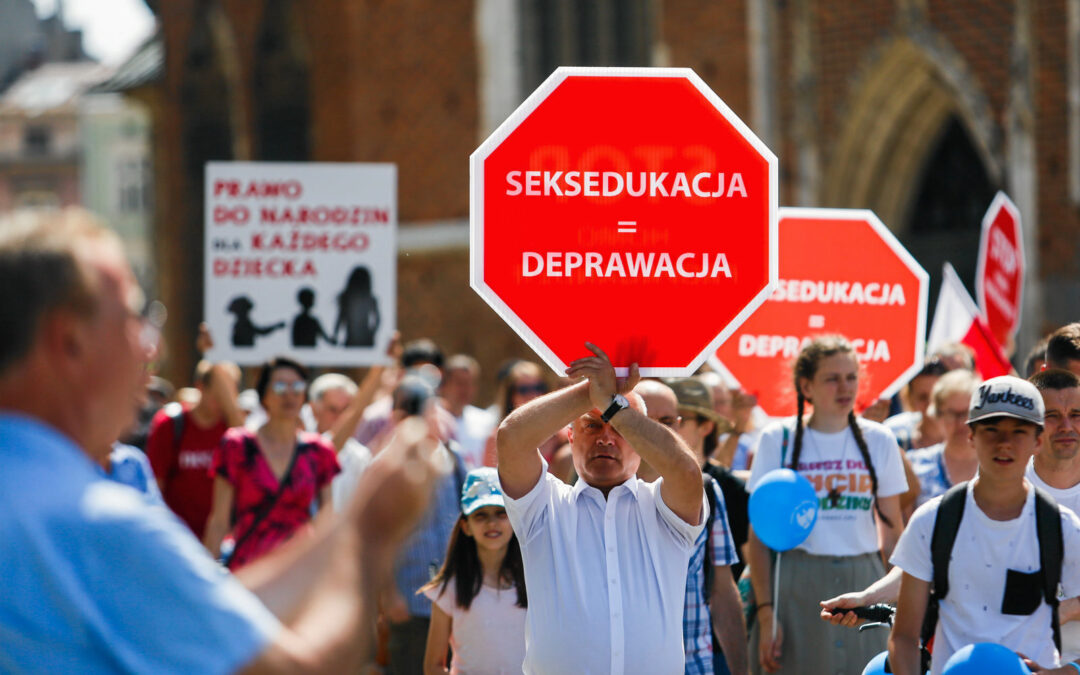Poland’s national-conservative government has approved plans that would make it easier for voluntary sex education programmes to be prevented from operating in schools at the request of parents.
The announcement by the education minister, Przemysław Czarnek, came as he criticised such a programme – called “Zdrovve Love” (meaning “Healthy Love”) – run by the opposition-controlled city of Gdańsk. Czarnek said that such content can “morally corrupt” children.
“We are introducing a solution, which was adopted at the last cabinet meeting, whereby, at the request of parents, the education superintendent will be able to block…the introduction of content into schools that is morally corrupting for children,” said Czarnek, quoted by the Polish Press Agency (PAP).
“If the mayor wants to provide this type of education to children in Gdańsk, she can do it in premises that belong to the city, but not at school,” he added. Earlier this year, Czarnek suggested that schools should teach sexuality using the writings of Pope John Paul II.
Launched in 2017, “Zdrovve Love” is part of Gdańsk’s “procreation support programme” and aims to provide sexual education to secondary-school pupils. Though workshops are held in schools, participation is voluntary and requires parental consent.
Among the classes offered are “Anatomy: health and hygiene”, “Contraception and family planning methods”, “Risky sexual behavior and sexually transmitted infections” and “Gender and social roles”. Parents can decide which specific classes their children attend, or for them to attend none at all.
Gdańsk suspended the programme in March 2020 due to the coronavirus pandemic. But it is due to return in the second semester of the current school year.
Despite being optional, the fact that the classes take place in public schools has drawn criticism from local politicians from Poland’s ruling Law and Justice (PiS) party, as well as ultraconservative legal association Ordo Iuris.
“The school is currently a place of a very strong cultural dispute,” said deputy mayor Monika Chabior, quoted by Wirtualna Polska. “Our Gdańsk approach to education, based on knowledge, self-awareness, also in relation to sexual health and sexual identity, is not well received in all environments.”
She noted that the provincial education superintendent, who is a government appointee, had “discouraged teachers from participating in workshops on working with LGBT children”. When teachers organised meetings with a refugee in schools, they were immediately investigation by the superintendent’s office, said Chabior.
Education superintendents have often been accused of implementing the government’s ideological agenda. This week, the superintendent in Małopolska province warned schools not to organise trips to see a new play, which she said was “anti-government” and “against the national interest”.
Earlier this year, she introduced the possibility for pupils to win extra credits on their school certificates by entering a contest to produce songs, poems, films or other artistic content opposing abortion, contraception, IVF and euthanasia.
Last year, the then education minister defended the superintendent in Łódź province after he warned that young people are threatened by an “LGBT virus” even more dangerous than COVID-19.
Sex education has long been a contentious issue in Poland, with liberals pushing for more comprehensive teaching in schools but conservatives arguing that it should be up to parents to decide what their children learn.
In 2019, some members of the ruling party expressed support for a proposed “anti-paedophilia” law that would jail anyone who “propagated engagement by minors in sexual activity” while “performing activities related to education on school premises”.
The European Parliament passed a resolution condemning the bill, which it described as an “alarming, misguided and detrimental” measure that “de facto seeks to criminalise the dissemination of sexuality education to minors”.
Main image credit: Adrianna Bochenek / Agencja Gazeta

Maria Wilczek is deputy editor of Notes from Poland. She is a regular writer for The Times, The Economist and Al Jazeera English, and has also featured in Foreign Policy, Politico Europe, The Spectator and Gazeta Wyborcza.




















